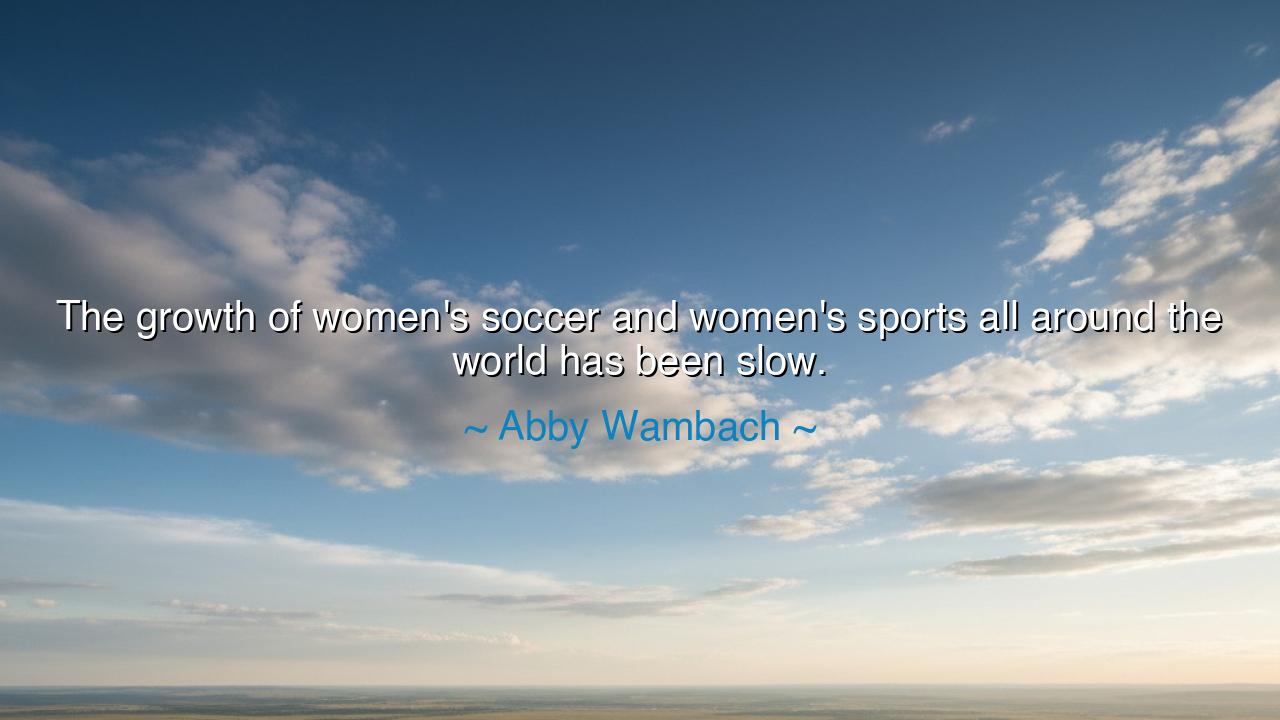
The growth of women's soccer and women's sports all around the






Hearken, O seekers of justice and truth, and mark the words of Abby Wambach, whose voice carries the weight of struggle and hope: “The growth of women's soccer and women's sports all around the world has been slow.” In this statement lies a quiet lament, yet also a clarion call: that progress, though relentless in the hearts of the brave, often moves with measured steps, and that the pursuit of equality demands courage, perseverance, and unwavering commitment.
The origin of this insight lies in the lived experience of those who have labored in fields long denied to them. For centuries, women were barred from stadiums, denied access to leagues, and discouraged from athletic endeavor, not for lack of skill or passion, but because societal norms dictated that sport was the domain of men. Wambach, a champion of the pitch, has seen this slow evolution firsthand, from sparse crowds and scant recognition to the global acclaim that women’s soccer enjoys today. Her observation is a testament to the long journey of struggle and resilience.
Consider the story of Mia Hamm, whose early career in the 1990s illuminated the possibilities of women’s soccer in America. Though she and her peers faced limited resources and recognition, their dedication carved a path for future generations. Each match played, each goal scored, was a stone laid in the foundation of progress, teaching that growth, though slow, is cumulative. Wambach’s words echo this continuity: that even incremental gains in visibility, respect, and opportunity are victories worth honoring.
Yet the slow pace of growth reveals deeper truths about human society. Change, especially in the realm of gender equality, challenges entrenched structures and ancient biases. Those who seek to elevate women’s sports confront cultural inertia, economic disparities, and persistent skepticism. The journey is not swift, but each triumph—a championship, a broadcast, an inspired young girl taking up the ball—is a beacon illuminating the path forward. Progress, as Wambach observes, is measured not only in speed but in lasting impact.
The ancients knew well the value of persistence. In Athens, women were largely excluded from public life, yet in secret schools and gatherings, knowledge and skill were nurtured, awaiting the day when society might recognize their worth. Similarly, the growth of women’s athletics requires cultivation, patience, and courage. Each act of participation, each challenge overcome, each record set, strengthens the roots from which a flourishing future will rise.
From this reflection, a lesson emerges: celebrate the strides made, however slow, and continue to push against barriers. Wambach’s words remind us that systemic change is rarely instantaneous, yet the dedication of those who persist shapes history. The growth of women’s sports is a mirror of the broader struggle for equality—incremental, often painstaking, yet inevitable when fueled by vision, resilience, and solidarity.
Practical action flows naturally from this wisdom. Support women’s teams, attend their matches, amplify their stories, and encourage young athletes of all genders to pursue their passions. Advocate for resources, recognition, and respect. Understand that growth is nurtured through collective effort, and that each voice and action contributes to the slow but unstoppable march toward equity.
Thus, let the words of Abby Wambach endure: the growth of women’s soccer and sports may be slow, but it is persistent, purposeful, and powerful. Embrace the journey, honor the pioneers, and work with determination, for in patience, action, and courage, the world of athletics—and indeed society itself—becomes fairer, stronger, and brighter for all.






AAdministratorAdministrator
Welcome, honored guests. Please leave a comment, we will respond soon